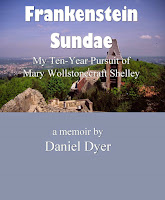To acquire a
reading copy of Mary's 1830 novel, Perkin Warbeck, I
employed the services of my wife, Joyce, who was teaching at Hiram College at
the time. Through interlibrary loan, she found me a copy, and I see in my
journal that on May 12, 1997, Joyce delivered Perkin to me when she got home from work that Monday afternoon. I
began reading it a few days later, and I see in my journal that I started it at
the McDonald’s in Aurora, Ohio; we were living there at the time, and it had
become my customary spot for early-morning reading—a fairly easy walk from our
home on (appropriately) Pioneer Trail. Black coffee and Mary Shelley.
Several
coincidences appear in my journal, as well. I see that the interlibrary loan
copy had come from Wittenberg (Ohio) University—Joyce’s alma mater (she’d
graduated in 1969; we met about a month later in a Kent State University classroom;
we married just five months after that!). In a less relevant coincidence: My
father had been in Wittenberg, Germany, during World War II. Wittenberg—just about
300 miles northeast of Castle Frankenstein.[1]
And the third
coincidence? Hang on a bit. First, my final entry on Perkin: 29th: Up
at 8; raining, so drove to McD’s to read a couple of chaps of PW; home: fussed with computer; finished PW; found myself in tears as Katherine and
Perkin bid farewell; her grief is so clearly the grief of MWS at the loss of [Bysshe]
Shelley & her children; made me want to find out more about Warbeck, the
historical figure; typed final notes …
As you can
see, I was already noticing in these, the early months of my Mary Shelley research
and reading, that she was infusing her fiction with emotions that she had
experienced most painfully herself—something many (most) writers do, of course.
Our emotional oceans, formed of tears, are full of fictional creatures that
flourish in such waters and require some effort to coax to the surface, where
we can see and identify—and employ—them. Over and over Mary wrote about the
things she knew most: hope and loss and love and loss and ambition and loss.
She knew—far too early—that life is not so much about acquiring as it is about
losing.
I still have
those notes I typed into my computer on Perkin
Warbeck back in the spring of 1997. Fourteen single-space pages in a
smallish font. So … how about a quick summary of the story—as Mary conceived
and wrote it?
[1] Dad had also told me that
some fellow GI’s had gone up to the University and printed Ph.D. degrees for
themselves.


No comments:
Post a Comment